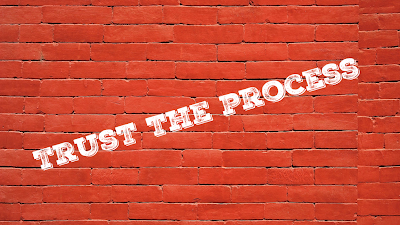It happened to me recently and it made me pause and think about what I was doing and the approach I was taking with a particular client. I kind of forgot about trusting the process! So, I took a step back and reevaluated and as a result, shifted our trajectory.
And- here's the thing, in order to help us "trust the process" we use a technique called muscle checking. I touched upon muscle checking in this blog post, but didn't do it justice.
Did you know that our subconscious mind is 90% of our intelligence? It remembers everything we do, feel, see, eat, etc. By tapping into that intelligence we are able to get information about the harmony or stress in the brain/body system.
Now, you may be thinking- come on now Amy- really? But- I'm telling you, it works. Muscle checking (AKA muscle testing) is a simple bio-feedback tool that can help us gain information from the client in order to help us trust the process. The body knows and can help us figure it out. Not only can we find out what reflex we need to work on, we can also find out other information such as a good goal for that day, or if there are other things we need to focus on such as addressing the Six Human Needs.
The subconscious mind knows what to work on and even in what order.
Ok, I hear you at this point. You're saying that you want to know more about this amazing tool and the science behind it.
I got your back. Let me explain.
First, let me start with the "sway" test. All living organisms have an instinctual urge to move towards positive and away from negative. Makes sense, right? By pure instinct, you're not going to walk into a burning hot fire in front of you- and you'll pull back if you get close- instinctually.
But, what if it isn't a burning hot fire that you're faced with, but instead, a stressful thought or event. Guess what? Your body will want to pull back away from that too.
You can tune into that response- just by standing still, arms relaxed and by your side (eyes closed if you need to) and by paying attention to subtle movements. It may take a little practice at first, but you will see- your body will sway backward. Keep that negative thought or event in your mind and your body will pull back. It might be very slight, or it may be more pronounced, but it will move backward-away from that stressful thought or event. Muscle checking is such an amazing bio-feedback tool and can even be taught to kids!!
We have another way of muscle checking too- using the deltoid muscle. In general, our muscles have three states of being: 1/3 is contracted and ready for action, 1/3 is relaxed and surveying the situation and 1/3 is fluctuating between the two. By tapping into those muscle states, we can use the deltoid muscle to check for a "positive" or "negative" response.
So, let's say that I wanted to use the deltoid muscle to confirm someone's name. What I would do is this: I would ask them to stretch out their arm in front on them, and I would apply slight pressure just above the wrist and push down as they (simultaneously) say something like "My name is __". If this is a "positive" response, in other words, a correct statement, the deltoid muscle "locks-in" and I will not be able to push the arm down. If the statement in incorrect, the muscle releases and the arm gives way. It's as if the person's brain was like "wait a minute.... that's not right!" and the muscle (in response) gives way.
It's actually very fun to see someone experience this for the first time. The look of shock on their face when they realize that (even if they are really trying) they just can't keep their arm up against that slight pressure. We tap into that subconscious intelligence and the body tells us the response through the muscles.
Seriously, how cool is that?!?
So going back to trusting the process. With muscle checking, it helps us with that trust. We don't need to use our cognitive thinking brain to figure out what to do all the time because we can ask the body!
Certainly, cognitive thoughts can help guide us in some respects and we certainly need to "think" during our sessions, but using muscle checking gives us an invaluable tool to tap into the part of the mind we can't easily access. The 90% that knows what that client needs on that particular day, for that particular goal, and even in what order to address it.
All we need to do is trust the body, and trust the process.
It hasn't failed me yet...

